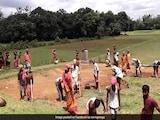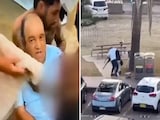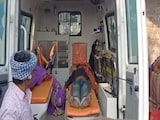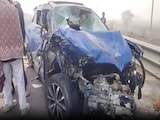Flooding and mudslides in the Colombian city of Mocoa sent torrents of water and debris crashing onto houses in the early hours of Saturday morning, killing 254 people, injuring hundreds and sending terrified residents, some in their pajamas, scrambling to evacuate.
Heavy rains caused several rivers to overflow, pushing sediment and rocks onto buildings and roads in the capital of southwestern Putumayo province and immobilizing cars in several feet of mud.
"It was torrential rainstorm, it got really strong between 11 pm and 1 am," said local resident Mario Usale, 42, who was looking for his father-in-law in the debris.
"My mother-in-law was also missing, but we found her alive two kilometers away. She has head injuries, but she was conscious."
Colombian President Juan Manuel Santos flew to Mocoa, population 345,000, to oversee rescue efforts on the city outskirts and speak with affected families.
"We will do everything possible to help them," Mr Santos said after confirming the death toll. "It breaks my heart."
The army said in a statement that 254 people were killed, 400 people had been injured and 200 were missing. More than 1,100 soldiers and police officers were called in to help dig people out in 17 affected neighborhoods.
Mr Santos gave a lower death toll of 193 via Twitter.
Climate change can play a big role in the scale of natural disasters, such as this one.
Even in a country where heavy rains, a mountainous landscape and informal construction of homes combine to make mud and landslides a common occurrence, the scale of the Mocoa disaster was daunting compared to recent tragedies, like a 2015 landslide that killed nearly 80 people in Salgar, Antioquia. Colombia's deadliest landslide, the 1985 Armero disaster, left more than 20,000 dead.
Rescue efforts
One thousand emergency personnel, including soldiers and local police, were helping the rescue effort. Mocoa was left without power or running water, and there were reports of people looting stores in search of bottled water.
"There are lots of people in the streets, lots of people displaced and many houses have collapsed," retired Mocoa resident Hernando Rodriguez, 69, said by telephone.
"People do not know what to do... there were no preparations" for such a disaster, he said.
"We are just starting to realize what has hit us."
Climate change can play a big role in the scale of natural disasters, such as this one, a senior UN official said.
"Climate change is generating dynamics and we see the tremendous results in terms of intensity, frequency and magnitude of these natural effects, as we have just seen in Mocoa," said Martin Santiago, UN chief for Colombia.
(With inputs from Reuters and AFP)















